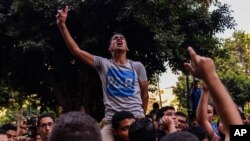Thousands of police and soldiers were deployed Monday across the Egyptian capital ahead of planned demonstrations against the government's transfer of two Red Sea islands to Saudi Arabia, a thorny issue which has already sparked the largest protests since President Abdel-Fattah el-Sissi assumed power nearly two years ago.
Following the arrest of dozens of activists and journalists in recent days, riot police backed by armored vehicles on Monday took up positions in Cairo's Tahrir Square, the epicenter of Egypt's 2011 uprising, They also deployed on the ring road, downtown and at a square where hundreds of Islamist protesters were killed when security forces broke up their sit-in in August 2013.
Many of the protest organizers' gathering points were sealed off by police, including the doctors' and journalists' unions in central Cairo. Pedestrians near the Press Syndicate were stopped by police, who asked for IDs and about their destination before turning many of them away. Minivans loaded with plainclothes policemen were also deployed in the likely flashpoints.
In the poor district of Nahya, in Cairo's twin city of Giza, the sheer number of deployed policemen and fear of arrest prevented protesters from even gathering — forcing them to trickle out of the area in small groups in the hope of assembling elsewhere, according to protesters speaking to an Associated Press reporter in the area. The protesters spoke on condition of anonymity for fear of reprisals.
The military said in a video released late Sunday that troops were deployed to protect "vital and important installations" and deal with anyone who tries to "harm the people's interests or attempt to ruin their happiness" on Sinai Liberation Day, a national holiday marking the completion of Israel's withdrawal from the peninsula in 1982.
Egyptian warplanes roared over Cairo to mark Monday's anniversary, but the military kept a low profile on the ground except for areas near military headquarters and the presidential palace. The Interior Ministry said police were out in force to protect "peaceful" citizens who wish to celebrate. Several dozen people waving Egyptian flags celebrated with music and dancing in the upscale district of Mohandiseen.
El-Sissi on Sunday urged citizens to defend the state and its institutions from the "forces of evil," an apparent reference to the planned protests.
Monday's planned demonstrations would be the second wave of protests this month against the decision to give up control of the islands at the mouth of the Gulf of Aqaba. On April 15, about 2,000 people protested in downtown Cairo over the islands.
That protest was the largest against el-Sissi since he assumed office in 2014, nearly a year after leading the military ouster of the Islamist Mohammed Morsi, Egypt's first freely elected leader. Chants of "leave," and "the people want to bring down the regime" rang out in the downtown area on that day, harkening back to the 2011 uprising that forced autocrat Hosni Mubarak to step down after nearly 30 years in power.
As was the case for the April 15 demonstrations, the Muslim Brotherhood, the Islamist group from which Morsi hails, has called on its supporters to take part in Monday's demonstrations. The group has been banned and is declared a terror group by authorities and the participation of its followers on Monday will increase the potential for violence.
Authorities have detained dozens of activists in recent days, with the arrests continuing until just hours before the planned demonstrations. Freedom for the Brave, an activist group, says nearly 100 people have been arrested since last week. On Monday, at least three journalists were arrested downtown, according to Khaled el-Balshy, a member of the Press Syndicate's board. Two of the three journalists were released several hours later.
Egypt says the islands of Tiran and Sanafir, off the southern coast of the Sinai Peninsula, belong to Saudi Arabia, which placed them under Cairo's protection in 1950 because it feared Israel might attack them.
The announcement came during a visit to Egypt this month by the Saudi monarch, King Salman, as the kingdom announced a multi-billion-dollar package of aid and investment to Egypt, fueling charges that the islands were sold off.
"Egypt needs the truth revealed to its people: Through dialogue, not suppression, with documents, evidence and maps, not security raids and random detentions," prominent columnist Abdullah el-Sinnawy wrote in Monday's edition of the Al-Shorouk daily.
"It's difficult to resolve a crisis like this one through the fist of security, no matter how tough it is."
El-Sissi insists that Egypt has not surrendered an "inch" of its territory and has demanded that people stop talking about the issue.
But the Egyptian leader has also faced mounting criticism about other matters, including the ailing economy and the abduction, torture and killing of an Italian graduate student in Cairo earlier this year. That incident has poisoned relations with Italy, one of el-Sissi's staunchest EU supporters and Egypt's biggest European trade partner.
Egyptian authorities have denied any involvement in the student's killing.




